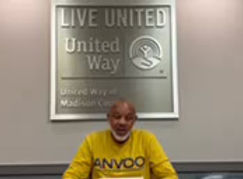WHO ARE WE?

OUR HISTORY
ANVOO started after one of the founders undertook the process of having his criminal record expunged in Connecticut and discovered that it was a complicated and often costly process. He realized that other non-violent felons would face the same obstacles and decided to start an organization that informs non-violent felons how to apply on their own to achieve the restoration of their voting rights, pardons, and expungement of their records.
In 2008, the founders began meeting with religious and community organization leaders in the Huntsville area to discuss the idea and its potential to serve as a viable non-profit organization. After receiving positive feedback, the founders decided to start ANVOO as a non-profit, charitable corporation in the state of Alabama, achieving incorporation on February 23, 2009. ANVOO formed a board of directors consisting of community activists and those with specific experience working with felons and non-profit charitable organizations.
Since incorporation, ANVOO has put together materials to provide to community organizations, churches, educational groups and business about ANVOO accomplishment.
FACTS
According to July data from the Bureau of Labor Statistics, there are 7.2 million jobs open in the US and 6 million hires. That means there are roughly 1.2 million unfilled positions.
“There is a huge talent gap out there,” notes Tony Lee, a vice president with SHRM. “Yet about 700,000 men and women are released from prison and re-enter society every year. They’ve served their time and want to be productive members of society again.”
Many employers are now turning to this group to reduce open job requisitions. In fact, 2,300 companies have signed SHRM’s pledge to extend offers to ex-offenders.
Here’s some advice for accessing this untapped talent pool:
-
Drop the stereotypes. “The misconception is that everybody in prison is a bad person, but the reality is that the prison population is hidden talent. These are talented people who made mistakes, people who could contribute to society but haven’t found the opportunity,” said Brandon Laster, an Enviro-Master franchise owner and former prisoner,in an interview with Black Enterprise. He joined the company as a salesman after release and worked his way up to franchise owner, with multiple formerly incarcerated people on his staff.
-
Study up.Talk to other business owners who have former prisoners in their workforce to understand how to be successful. Many faith-based organizations and nonprofits have employment training and placement services and are looking for businesses to partner with. SHRM has even developed a toolkit for employers who want to help the formerly incarcerated return to work.
-
-
Be transparent.“You don’t want situations where people are gossiping. It creates unnecessary angst,” Lee explains. Share your plan with current employees, customers and board members. “If you say, ‘We’re actively recruiting people with nonviolent criminal histories,’ many of the fears are eliminated. These are people who made a single mistake and are ready to be productive. We have opportunities we can’t fill and we’re being smart about it. Then you’re more likely to get buy-in from the staff that this is something that’s right.”
-
-
Access the talent pool. Many former prisoners move to halfway houses after release to ease the transition back into day-to-day life. Pat Swisher, founder and president of Enviro-Master, who spent 18 months in prison for tax evasion, suggests reaching out to these local organizations. “Ask the director if you can come to interview people who are looking for work or wanting to start or restart a career,” he notes.
-
-
Hire smart.“Fit” is important in any position, but it’s especially important when hiring people with criminal records. “Know what they were convicted of,” says Swisher. “You’re not going to hire someone with a violent background,” he notes. But you also don’t want to bring on someone with a DUI to drive your delivery van.
-
Still not convinced? Consider this: A Johns Hopkins Hospital longitudinal study found that “banning the box” (indicating a criminal record) on applications, and hiring on merit and the relevance of prior convictions to the position, gets results. The turnover rate for new hires with criminal records was lower than those without.
“Many convicted felons are thinking they will be flipping hamburgers for the rest of their lives,” Swisher says. “They appreciate being given the opportunity and show a lot of loyalty towards you and that job.”
